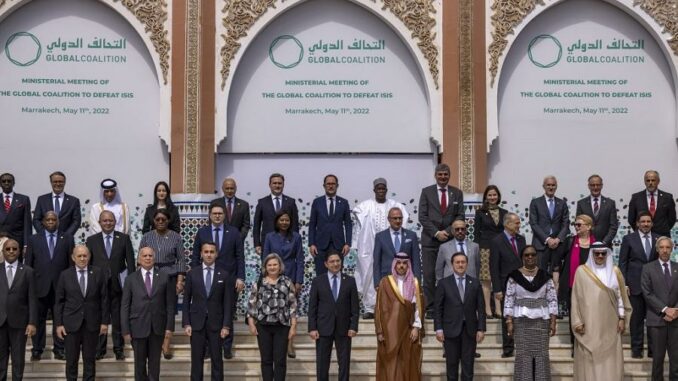
Participants in the Ministerial Meeting of the Global Coalition to Defeat ISIS, which convened in Marrakech on Wednesday, expressed concern over the proliferation of separatist movements in Africa, like the Algeria-backed polisario, and their collusion with terrorist groups, such as AQIM, al Shabab, Boko Haram…
The participants noted with concern the proliferation of non-state actors, including separatist movements that generate destabilization and further vulnerability of African states and that ultimately favor ISIS and other terrorist and violent extremist organizations, said a final communiqué issued at the end of the meeting that was attended by the representatives of over 80 countries and international organizations.
In a closing statement, the Coalition members said they are concerned at the proliferation of separatist movements in Africa which causes destabilization and state fragility “which in turn is favorable for ISIS and other terrorist” organizations.
They insisted on the nexus between separatist and terrorist movements acting in collusion, exploiting existing vulnerabilities in a way that multiplies their destabilizing impact. In this sense, the participants emphasized the need to address the evolving threat of Daesh, especially in Africa, by strengthening the counter-terrorism capabilities of African members and taking into account the challenges and threats posed by the proliferation of non-state actors, including separatist groups, as a destabilizing and vulnerability-generating factor in the region.
Under the auspices of the Global Coalition to Defeat Daesh/ISIS, the Africa Focus Group will bolster the civilian-led counterterrorism capabilities of the Coalition’s African members, they said, stressing the need for the Africa Focus Group to foster synergies with other existing international, sub-regional and regional counterterrorism efforts and initiatives on the African continent.
The Ministers also recalled that the Coalition will continue to be a civilian-driven effort by, with, and through its African members, in line with the principles of national ownership, and in accord with the specific needs of African member states.
They also stressed the importance of addressing underlying causes to insecurity in Africa, while reiterating that any lasting solution to halting the spread of Daesh/ISIS on the continent will rely primarily on national authorities, as well as sub-regional and regional efforts and initiatives that acknowledge and address the political and economic drivers of conflict.
The participants emphasized the need to address the global Daesh/ISIS threat through holistic and comprehensive coordination of efforts, which are a hallmark of the Coalition.
Such efforts include the initiatives forwarded by the Coalition Working Groups, including Communications, Counter ISIS Finance, Foreign Terrorist Fighters, and Stabilization, the statement said.
They also welcomed the first Global Coalition to Defeat Daesh/ISIS meeting to be convened in Africa.
The Ministerial Meeting of the Global Coalition to Defeat ISIS was held at the joint invitation of the Minister of Foreign Affairs, Nasser Bourita, and the U.S. Secretary of State, Antony Blinken.
The event is a turning point in the commitment and international coordination in the fight against Daesh, with a particular focus on the African continent and the evolving terrorist threat in the Middle East and other regions.
